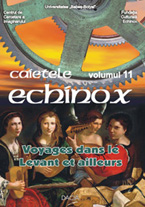Ecrire en exil, ecrire l'exil
Writing in exile, writing about the exile
Author(s): Elena MarcheseSubject(s): Literary Texts
Published by: Universitatea Babeş-Bolyai
Keywords: Lebanese literature; Abla Farhoud; exile; the status of women
Summary/Abstract: In this article, I intend to analyze how it is said and lived the exile in the novels of Abla Farhoud, Le bonheur a la queue glissante (1998) [Happiness has the slipping tail] which gained the France-Quebec price in 1999, et Splendide Solitude (2001) [Splendid loneliness]. Abla Farhoud, an author of Lebanese origin from Quebec, lived the uprooting in her own youth when she left Lebanon, with her family, to settle in Quebec. In her novels, where the personal experience is often combined with the fiction, the female protagonists must face the condition of the exile, they must learn how to be reinvented in order to create a new identity and to find again their love for life. Although the exile is represented in a different way in the two novels, one can however affirm that the protagonists live the exile not only as immigrant, but also as women who remain still excluded from certain social functions. In Le bonheur a la queue glissante, the protagonist, Dounia, lives a triple exile. Initially, she is exiled to have left her native land. Then, she is also exiled on the social standing because, as a woman, and especially an immigrant woman, she seems to be able to fulfill herself only like a mother and a wife, within her family. Finally, the linguistic exile deprives Dounia of her word, and consequently, she does not have the possibility of being affirmed. In Splendide Solitude, the protagonist is a woman who, after a life devoted to her family, finds herself alone and has to think about her life. Her loneliness thus becomes a metaphor of her alienation, of seclusion not only from the others but also from herself. The exile seems to be a difficult condition to support especially when the women are confronted with it. However, it is thanks to their sensibility that they can find in themselves the impulse to survive, to live.
Journal: Caietele Echinox
- Issue Year: 2006
- Issue No: 11
- Page Range: 143-152
- Page Count: 10
- Language: French
- Content File-PDF

